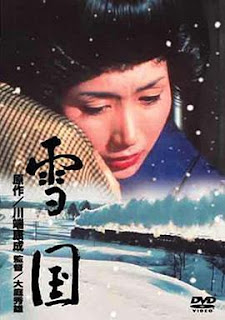61. Yoko tī hia kòng âng-tāu-á
Keh-kang, Komako chiàu-siâng chin chá tō khí-chhn̂g.
"Góa bāng tio̍h khì chhah-hoe sai-hū ê pâng-keng piàⁿ-sàu, chū án-ne chhéⁿ khí-lâi."
Poaⁿ kàu thang-á piⁿ ê se-chng tâi, kiàⁿ lih chiò tio̍h khàm móa âng-hio̍h ê soaⁿ. Kiàⁿ lāi ê chhiu-thiⁿ ji̍t-thâu, kng-iām chhàn-lān.
Thn̂g-á-tiàm ê chă-gín-á the̍h Komako thè-ōaⁿ ê saⁿ lâi.
"Koma-Chan." Che m̄-sī ùi thoah-mûi gōa-kháu thoân lâi ê chheng-chhó kah ē sim-suiⁿ ê Yoko ê kiò siaⁿ.
"Hit-ê ko͘-niû án-nóa ah?"
Komako kā Shimamura gán chi̍t-ē, kóng:
"Yi chhêng-chāi khì pài bōng. Lí khòaⁿ, chhu-seh tiûⁿ ē-kha ū chi̍t-khu kiô-be̍h; khui pe̍h hoe. He tò-pêng tō sī bōng-á po͘, kám m̄-sī?"
Komako túiⁿ liáu-āu, Shimamura mā kiâⁿ khì chng lih sàn-pō͘.
Pe̍h-piah ê gîm-chîⁿ-kha, chi̍t-ê chhēng chu-âng jiông-á seh-khò͘ ê chă-gín-á tī hia phah chhiū-leng kiû. Khak-si̍t sī chhiu-thiⁿ ê kéng-tì.
Ū chin chē kó͘-chá-sek ê chhù, tāi-khài sī í-chá pak-pêng ê Daimyo (大名, its 諸侯) lo̍h-lâm chham-kìⁿ Bakufu (幕府) ê sî-tāi só͘ khí-chō ê. Gîm-chîⁿ chhim-chhim, lâu-téng ê chóa thang-á kan-ta chi̍t-chhioh koân, sī tn̂g-liau hêng ê. Gîm-chîⁿ ē-kha kòa hm̂-á pian ê jia-lî.
Thô͘-phiâⁿ téng chèng chi̍t-chōa koaⁿ-bang lî-pa. Koaⁿ-bang khui móa-móa chhián-ûiⁿ ê hoe. Iù koh tn̂g ê hio̍h-á chi̍t-ki chi̍t-ki chhun chhut-lâi, súi kah ná-chhiūⁿ sī phùn-chôaⁿ.
Lō͘-piⁿ àⁿ-ji̍t ê só͘-chāi pho͘ chi̍t-niá chháu-chhio̍h-á, Yoko tī hia kòng âng-tāu-á.
Sè-sè ê âng-tāu-jîn ná-chhiūⁿ hoat-kuiⁿ ê chu-á án-ne, ùi ta tāu-châng thiàu chhut-lâi.
In-ūi thâu pau chhiú-kin, bô khòaⁿ-e Shimamura, chhēng seh-khò͘ ê Yoko kha-thâu-u peh khui-khui, ná kho̍k âng-tāu, ná chhiùⁿ he im-tiāu chheng-chhó kah kiâng boeh sim-suiⁿ, ná-chhiūⁿ tá-ūi hôe-im lâi ê koa:
"Ia̍h-á, chhân-eⁿ, hām tō͘-kâu,
"Tī soaⁿ-téng ki-ki kā-kā tih chhiùⁿ-koa,
"Iáu ū matsumusi (松虫), suzumusi (鈴虫) hām chàu-ke."
--
61. Yoko tī 遐摃紅豆仔
隔工, Komako 照 siâng 真早 tō 起床.
"我夢著去插花師傅 ê 房間拚掃, 自 án-ne 醒起來."
搬到窗仔邊 ê 梳妝台, 鏡 lih 照著崁滿紅葉 ê 山. 鏡內 ê 秋天日頭, 光艷燦爛.
糖仔店 ê chă 囡仔提 Komako 替換 ê 衫來.
"Koma-Chan." 這毋是 ùi 挩 mûi 外口傳來 ê 清楚 kah 會 sim-suiⁿ ê Yoko ê 叫聲.
"彼个姑娘 án-nóa ah?"
Komako kā Shimamura 眼一下, 講:
"她 chhêng 在去拜墓. 你看, 趨雪場下跤有一坵蕎麥; 開白花. He 倒爿 tō 是墓仔埔, 敢毋是?"
Komako túiⁿ 了後, Shimamura mā 行去庄 lih 散步.
白壁 ê 砛簷跤, 一个穿朱紅絨仔雪褲 ê chă 囡仔 tī 遐拍樹奶球. 確實是秋天 ê 景致.
有真濟古早式 ê 厝, 大概是以早北爿ê Daimyo (大名, its 諸侯) 落南參見 Bakufu (幕府) ê 時代所起造 ê. 砛簷深深, 樓頂 ê 紙窗仔干焦一尺懸, 是長 liau 形 ê. 砛簷下跤掛茅仔編 ê 遮簾.
塗坪頂種一逝菅芒籬笆. 菅芒開滿滿淺 ûiⁿ ê 花. 幼 koh 長 ê 葉仔一支一支伸出來, 媠 kah ná 像是噴泉.
路邊 àⁿ 日 ê 所在鋪一領草蓆仔, Yoko tī 遐摃紅豆仔.
細細 ê 紅豆仁 ná 像發 kuiⁿ ê 珠仔 án-ne, ùi 焦豆叢跳出來.
因為頭包手巾, 無看 e Shimamura, 穿雪褲 ê Yoko 跤頭趺 peh 開開, ná 硞紅豆, ná 唱 he 音調清楚 kah kiâng 欲心 suiⁿ, ná 像 tá 位回音來 ê 歌:
"蝶仔, 田嬰, 和杜猴,
"Tī 山頂 ki-ki kā-kā tih 唱歌,
"猶有 matsumusi (松虫), suzumusi (鈴虫) 和灶雞."
--
61.
Komako was up early the next morning. "I dreamed I was cleaning house for the woman who teaches flower-arranging, and I woke up."
She had moved the little dresser over to the window. In the mirror the mountains were red with autumn leaves, and the autumn sun was bright.
This time it was not Yoko he heard, Yoko calling through the door in that voice so clear he found it a little sad. Komako's clothes were brought rather by the little daughter of the man with whom she had her contract.
"What happened to the girl?" Shimamura asked.
Komako darted a quick glance at him. "She spends all her time at the cemetery. Over there at the foot of the ski course. See the buckwheat field -- the white flowers? And the cemetery to the left of it?"
Shimamura went for a walk in the village when Komako had left.
Before a white wall, shaded by eaves, a little girl in "mountain trousers" and an orange-red flannel kimono, clearly brand-new, was bouncing a rubber ball. For Shimamura, there was autumn in the little scene.
The houses were built in the style of the old regime. No doubt they were there when provincial lords passed down this north-country road. The eaves and the verandas were deep, while the latticed, paper-covered windows on the second floor were long and low, no more than a foot or so high. There were reed blinds hanging from the eaves.
Slender autumn grasses grew along the top of an earthen wall. The pale-yellow plumes were at their most graceful, and below each plume narrow leaves spread out in a delicate fountain.
Yoko knelt on a straw mat beside the road, flailing at beans spread out before her in the sunlight. The beans jumped from their dry pods like little drops of light.
Perhaps she could not see him because of the scarf around her head. She knelt, flailing away at the beans, her knees spread apart in their "mountain trousers," and she sang in that voice so clear it was almost sad, the voice that seemed to be echoing back from somewhere.
"The butterfly, the dragonfly, the cricket. The pine cricket, bell cricket, horse cricket Are singing in the hills."
--

